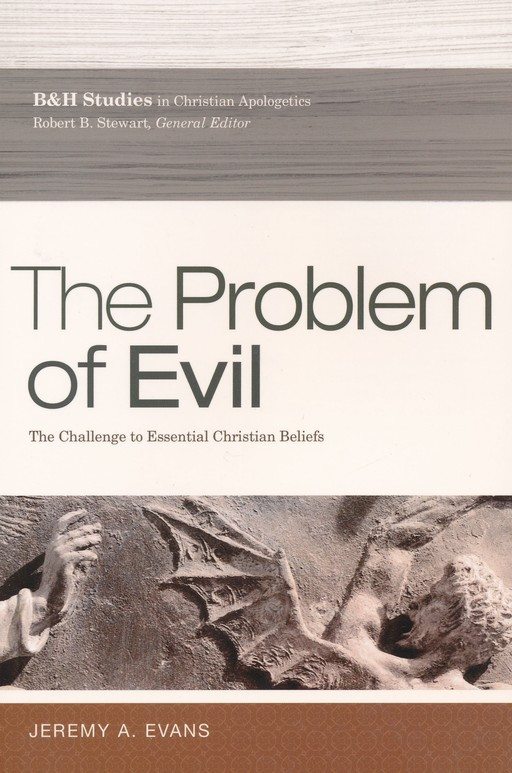The problem of evil has arguably been the most significant objection to the Christian faith throughout history. From the hardened atheist attempting to demonstrate the logical impossibility of God’s existence to the troubled saint crying out to God amid pain and suffering, the reality of evil has led to a host of questions that require a thoughtful and biblical response. One recent attempt to navigate through several of these issues is Jeremy Evans’s The Problem of Evil: The Challenge to Essential Christians Beliefs.
The first half of Evans’s book surveys and responds to a number of problems raised concerning the topic of evil. In Chapters 2 and 3 he addresses the logical and evidential problems of evil. Both arguments attempt to prove—one deductively, the other inductively—that God doesn’t exist. In response to the deductive argument, Evans, professor of philosophy at Southeastern Seminary in Wake Forest, North Carolina, follows Alvin Plantinga in offering a free will defense for why evil doesn’t logically imply the non-existence of God. The evidential argument points out that the amount and kinds of evil in the world serve as strong evidence against the existence of God insofar as it’s hard to conceive of what possible good God could bring about by means of apparently pointless evil. Evans’s response appeals to theistic skepticism, the idea that God may have purposes in allowing evil that are beyond our ability to comprehend by virtue of our finitude. We are not, therefore, allowed to conclude God has no legitimate reasons at all.
After employing free will as the answer to the “why”question of evil, in Chapter 4 Evans seeks to answer the “what now” question. That is, given evil in the world, how ought we respond? Evans formulates his answer to this question in terms of the defeat of evil. We participate in the defeat of evil by actively standing against it, which requires aligning with God in conversion.
In chapters 5, 6, and 7 Evans discusses the problems of divine hiddenness, hell, and natural evil. He defends a traditional view of hell against both universalism and annihilationism. In his discussion of natural evil he contrasts theism with naturalism and contends theism has more explanatory power than naturalism when it comes to making sense of natural evil.
The second half of Evans’s book revolves around his response to the deontological problem of evil—which suggests that if a good God exists he’d be morally obligated to prevent certain evils from occurring in the world. That these evils do in fact occur implies no good God exists. Responding that it’s improper to speak of God having obligations at all, Evans leads us through discussions of the divine command theory of ethics, the Euthyphro objection, and the freedom of God.
You Can’t Use the Bible—This Is Philosophy!
What I greatly appreciated about The Problem of Evil was the extent to which it is self-consciously Christian, not merely theistic. It’s sadly rare to see contemporary Christian philosophy done in such a way that maintains Christian commitment to biblical authority even over matters of philosophy. In reading this book I found myself writing amen in the margins, as Evans didn’t merely tag verses onto the end of a philosophical discourse; rather, at key points in his argument he appealed to scriptural authority and to theology in dealing with philosophical problems. Some brief examples:

The Problem of Evil: The Challenge to Essential Christians Beliefs
Jeremy Evans
The Problem of Evil: The Challenge to Essential Christians Beliefs
Jeremy Evans
Another way of discovering what God would do is to take special revelation seriously and resolve to answer what God has done. (38)
One of the more promising lines of response . . . is to take seriously the implications of the fall of Adam and Eve. (67)
I contend that one reason we recoil from the doctrine of hell is that we have not taken seriously the biblical concept of church discipline. (105)
In my opinion, we need more of this in Christian philosophy. If we really believe the Word of God is authoritative and sufficient for all of life, then we shouldn’t feel we must check our worldview commitments at the door in order to join the philosophical discussion. Evans provides us with an admirable example of this in his aim to bring Scripture and theology to bear on philosophical questions throughout his book.
Libertarianism Assumed
The aspect of the book I found most disappointing—though I can’t say I was particularly surprised—was Evans’s assuming a libertarian notion of free will. Of course, this is a common position among Christian philosophers today, and how divine sovereignty and human responsibility relate is a massive debate. In fact, it’s impossible to address the questions he tackles in The Problem of Evil without taking a position on the issue. I mention this only to point out that if you espouse a more compatibilist notion of human freedom you may find some of Evans’s arguments unsatisfying, as his libertarianism comes into play at several points throughout the book.
Evans has managed in a little more than 200 pages to provide a surprisingly thorough survey of several problems arising from the reality of evil—as well as important related issues of ethics and our conception of God. And best of all, he’s unafraid to use special revelation in his argumentation—a refreshingly necessary posture and approach.
































